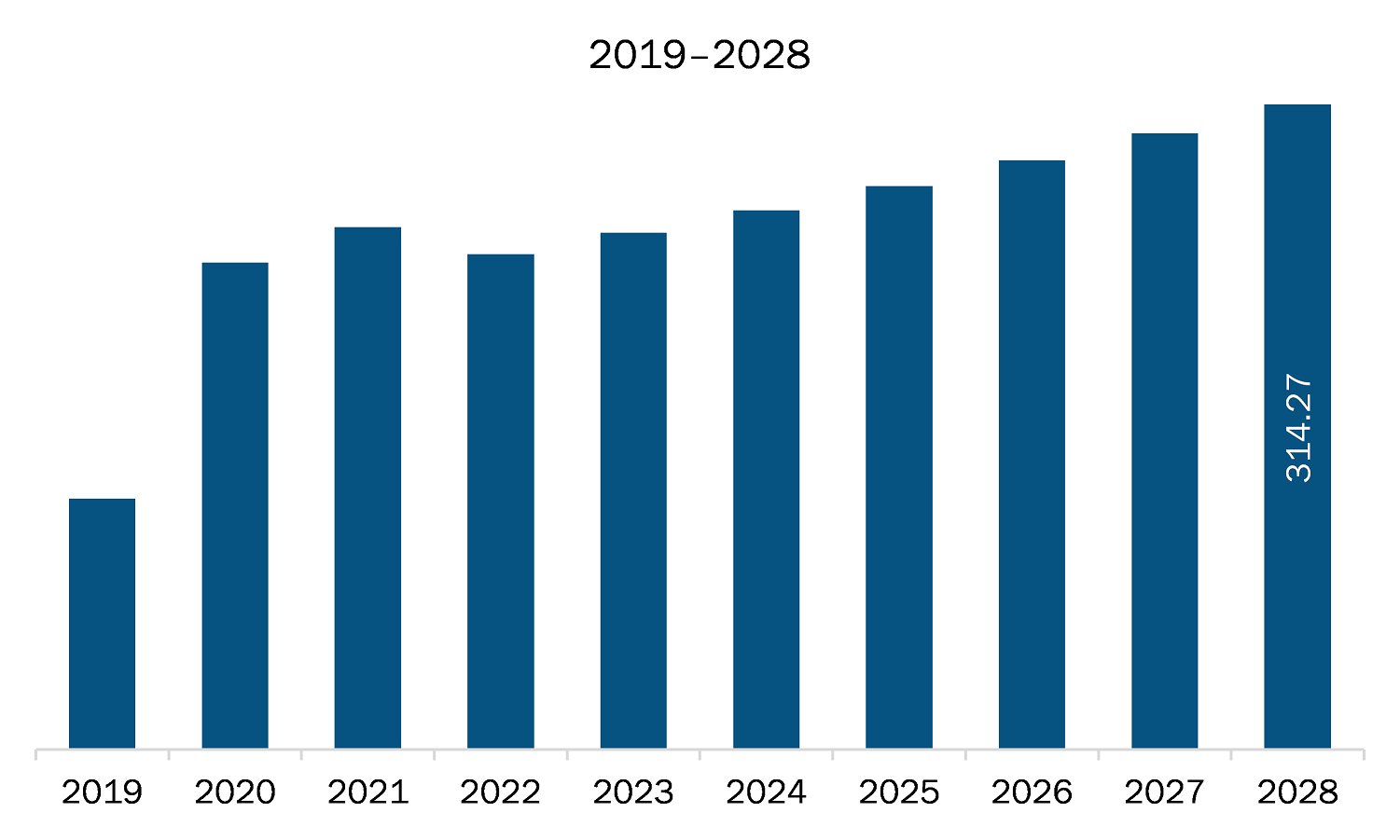The virology market in SAM is expected to grow from US$ 254.48 million in 2021 to US$ 314.27 million by 2028; it is estimated to grow at a CAGR of 3.1% from 2021 to 2028.
Brazil and Argentina are economies in South America. Viral infection is among the leading causes of human chronic diseases. A few viruses, such as human immunodeficiency virus (HIV), flu virus, Zika, Diphtheria, Ebola, SARS-CoV-2 (COVID-19), Polio, and Tetanus (Lockjaw), infect large populations across the world. As virus mutate and evolve continuously, drug resistance become an impending challenge for viral infection management among the human and animals. A virus transmits through various mediums based on its type. For instance, some viruses cause respiratory viral diseases, such as flu, common cold, and respiratory syncytial virus infection, transmits through droplets generated through coughing or sneezing, while some because gastrointestinal viral diseases transmitted through feces contaminated food or water. The novel coronavirus that causes COVID-19 was identified in 2019. The International Committee on Taxonomy of Viruses (ICTV) declared the virus as Severe Acute Respiratory Syndrome Coronavirus 2 (SARS-CoV-2) on February 11, 2020, and later WHO named the disease as COVID-19. The virus has undergone mutation a couple of times since its outbreak, which has added to the severity of the COVID-19 pandemic. Therefore, the rising prevalence of viral infections drives the growth of the SAM virology market.COVID-19 has created shock waves with severe health, economic and social consequences, which will affect many countries in South America in the future. The COVID-19 pandemic has brought the risk of major disease outbreaks and highlighted countries’ lack of preparedness to fight them. Climate change, urbanization, and the lack of water and sanitation are contributing to fast-spreading outbreaks. Argentina was already in a fragile socio-economic situation before the COVID-19. According to the National Institute of Statistics and Censuses (INDEC), economic activity fell by 10.3% in May 2020, while annual inflation reached 42.8% in June 2020. The fragile health systems in many of these countries and their limited means to finance or drive vaccine development on their own have also put the large population at heightened risk. The COVID-19 pandemic has disrupted healthcare services across South America. For instance, in Guatemala, the COVID-19 has severely impacted HIV services; HIV testing decreased by 54.7% in 2020. As per the PAHO, since the onset of the pandemic, the number of people being tested for HIV in Latin America has dropped sharply. COVID-19 is expected to exacerbate this situation, especially in countries with fragile health systems.
With the new features and technologies, vendors can attract new customers and expand their footprints in emerging markets. This factor is likely to drive virology market. The SAM virology market is expected to grow at a good CAGR during the forecast period.

- This FREE sample will include data analysis, ranging from market trends to estimates and forecasts.
SAM Virology Market Segmentation
SAM Virology Market – By Type
- Diagnostic Test
- DNA Virus Testing
- RNA Virus Testing
- Others
- Viral Infection Controlling Techniques
- Active Prophylaxis
- Passive Prophylaxis
- Antiviral Therapeutics
- Virucidal Agents
- Antiviral Agents
- Immunomodulators
- Interferons
SAM Virology Market – By Application
- Skin and Soft Tissue Infections
- Respiratory Tract Infections
- GI Tract Infections
- Sexually Transmitted Diseases
- Urinary Tract Infections
- Others
SAM Virology Market – By End User
- Hospitals
- Diagnostic Laboratories
- Pharmaceutical and Biotechnological Companies
- Research and Academic Institutes
SAM Virology Market- By Country
- Brazil
- Argentina
- Rest of SAM
SAM Virology Market-Companies Mentioned
- Abbott
- AbbVie Inc.
- F. Hoffmann-La Roche Ltd.
- Gilead Sciences, Inc.
- GlaxoSmithKline Plc
- Illumina, Inc.
- Johnson and Johnson Services, Inc.
- QIAGEN
- Siemens AG
- Thermo Fisher Scientific Inc.
South America Virology Report Scope
| Report Attribute | Details |
|---|---|
| Market size in 2021 | US$ 254.48 Million |
| Market Size by 2028 | US$ 314.27 Million |
| CAGR (2021 - 2028) | 3.1% |
| Historical Data | 2019-2020 |
| Forecast period | 2022-2028 |
| Segments Covered |
By Type
|
| Regions and Countries Covered |
South and Central America
|
| Market leaders and key company profiles |
|
- Historical Analysis (2 Years), Base Year, Forecast (7 Years) with CAGR
- PEST and SWOT Analysis
- Market Size Value / Volume - Regional, Country
- Industry and Competitive Landscape
- Excel Dataset
Recent Reports
Testimonials
Reason to Buy
- Informed Decision-Making
- Understanding Market Dynamics
- Competitive Analysis
- Identifying Emerging Markets
- Customer Insights
- Market Forecasts
- Risk Mitigation
- Boosting Operational Efficiency
- Strategic Planning
- Investment Justification
- Tracking Industry Innovations
- Aligning with Regulatory Trends






















 Get Free Sample For
Get Free Sample For